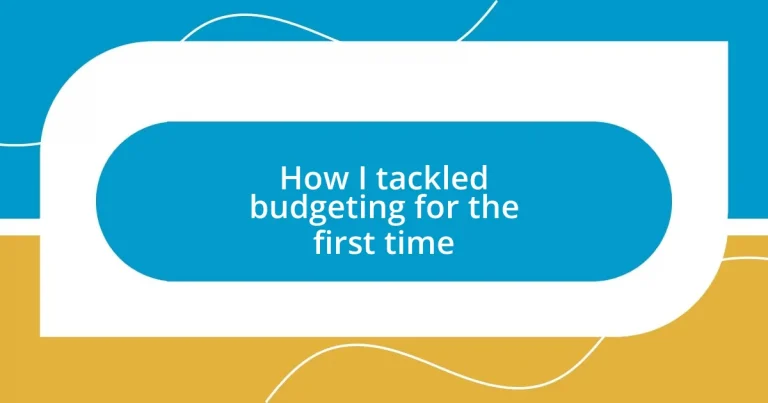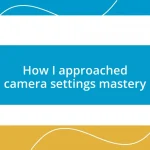Key takeaways:
- Budgeting is essential for achieving financial peace of mind and understanding spending habits.
- Setting realistic, specific financial goals using SMART criteria helps maintain motivation and clarity.
- Regularly tracking expenses and adjusting the budget as needed allows for adaptability in financial planning.
- Utilizing the right budgeting method is crucial; choose one that aligns with personal values and lifestyle.
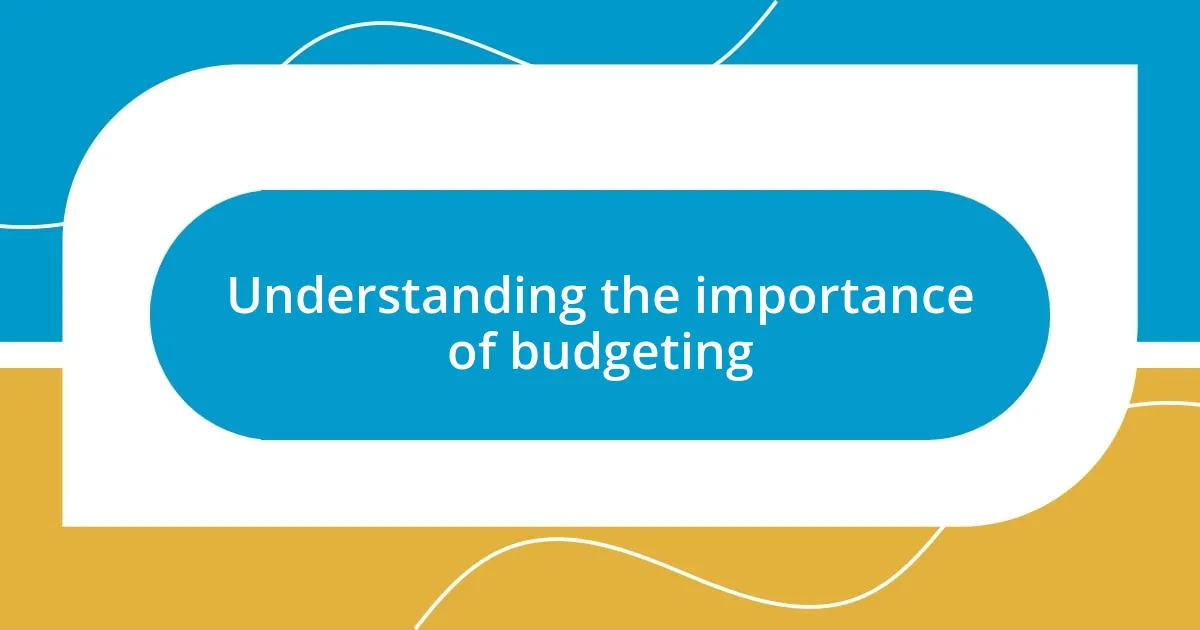
Understanding the importance of budgeting
Budgeting can often feel overwhelming, especially when it’s your first time dealing with finances. I remember staring at my income and expenses, trying to figure out how to make sense of it all. The realization hit me: budgeting isn’t just about numbers; it’s about peace of mind. Have you ever felt that nagging worry about unexpected expenses? A solid budget can help eliminate that stress by allowing you to plan for the future.
Understanding your spending habits is another crucial part of budgeting. I discovered that certain impulse purchases were sneaking up on me, leading to a tight financial squeeze by the end of the month. It was almost enlightening to see where my money was really going. Have you tracked your spending before? It can be eye-opening, revealing patterns you may not have been aware of.
Ultimately, budgeting lays the foundation for achieving your financial dreams. When I started setting aside money for travel or a new car, I felt a sense of empowerment. It made me rethink my priorities and gave me the motivation to stick to my budget. Isn’t it exciting to dream of future possibilities rather than worrying about bills? That feeling alone makes budgeting worthwhile!
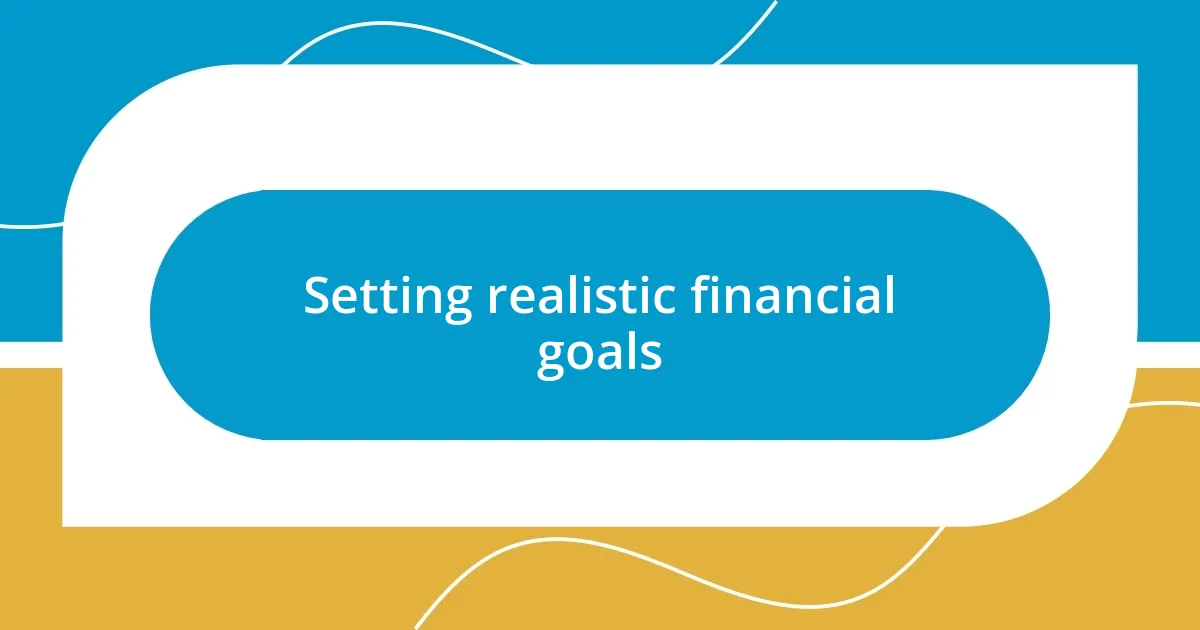
Setting realistic financial goals
Setting financial goals is essential for effective budgeting. I found that when I started with SMART criteria—Specific, Measurable, Achievable, Relevant, Time-bound—my goals became clearer. For instance, instead of saying, “I want to save money”, I defined it as “I want to save $1,000 in six months for a vacation.” This made the process not only measurable but also achievable. Has setting clear targets helped you before?
As I worked towards my goals, I learned to break them into smaller, actionable steps. Instead of feeling daunted by the overall target, I focused on saving a specific amount each week. This approach transformed my mindset; it was rewarding to see my progress, even if it was small. Each time I transferred money into my savings, I felt a sense of accomplishment and excitement. A little joy goes a long way, doesn’t it?
Another layer to this is setting goals that resonate with your personal values. When I identified what was truly important to me—like travel and education—it became easier to stay committed. My goal wasn’t merely about accumulating funds; it was about funding experiences that enriched my life. What do you hope to achieve with your finances? Understanding the “why” behind your goals connects you to your budget on a deeper level.
| Goal Type | Description |
|---|---|
| Short-term Goals | Saving for immediate needs like an emergency fund or a tech gadget. |
| Mid-term Goals | Planning for future experiences, such as vacations or home improvements. |
| Long-term Goals | Investing for retirement or major life events like buying a house. |
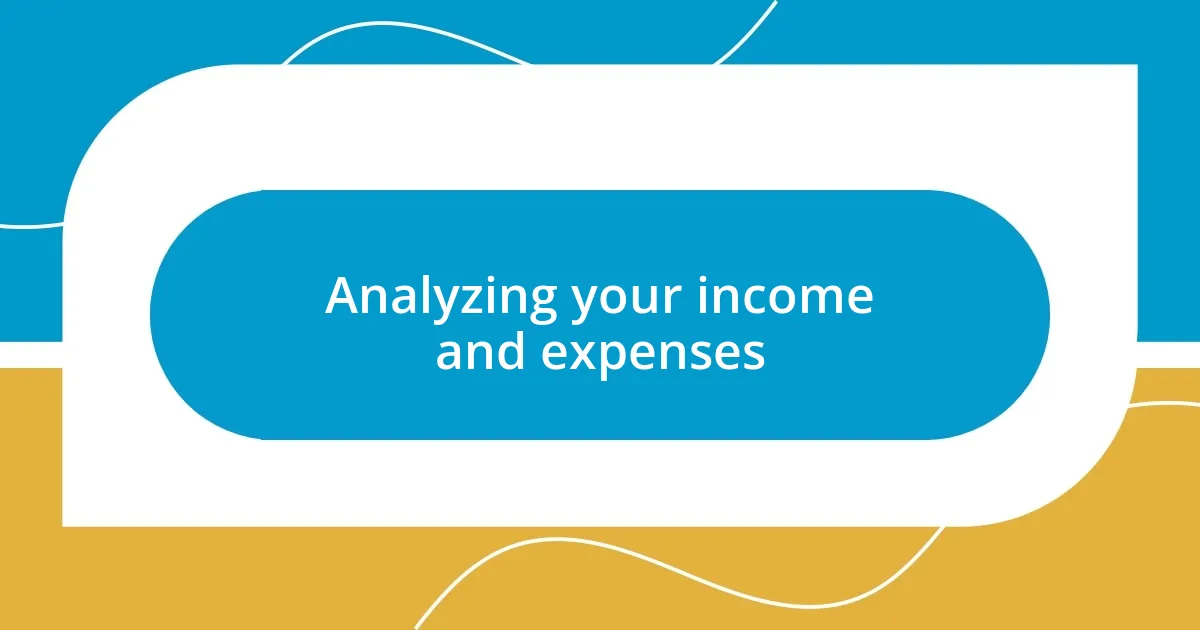
Analyzing your income and expenses
Analyzing your income and expenses is a pivotal step in creating a budget. I still remember the moment I listed all my sources of income and felt a wave of relief wash over me. It was like shining a flashlight in a dark room; suddenly, I could see where I stood financially. Once I had everything laid out, the next step was to trace those pesky expenses that seemed to appear out of nowhere, revealing my patterns of spending. That clarity was invaluable—being able to visualize my financial landscape helped me make informed decisions.
When I set out to analyze my finances, I kept track of all my income and expenses for a month, and it revealed some surprising insights. Here’s a breakdown of what I found helpful in this process:
- Income: Include all sources such as salary, side jobs, and any passive income.
- Fixed Expenses: Rent, utilities, and loan payments that don’t change month to month.
- Variable Expenses: Groceries, dining out, and entertainment, which can fluctuate.
- Savings and Investments: Contributions to savings accounts, retirement funds, or investments.
- Miscellaneous Expenses: Unplanned purchases or one-time events that can sneak up on you.
By thoughtfully analyzing each category, I not only gained insight into my financial habits but also identified areas for adjustment, which ultimately helped me embrace budgeting with confidence. What about you? Have you uncovered valuable lessons by diving deep into your income and expenses?
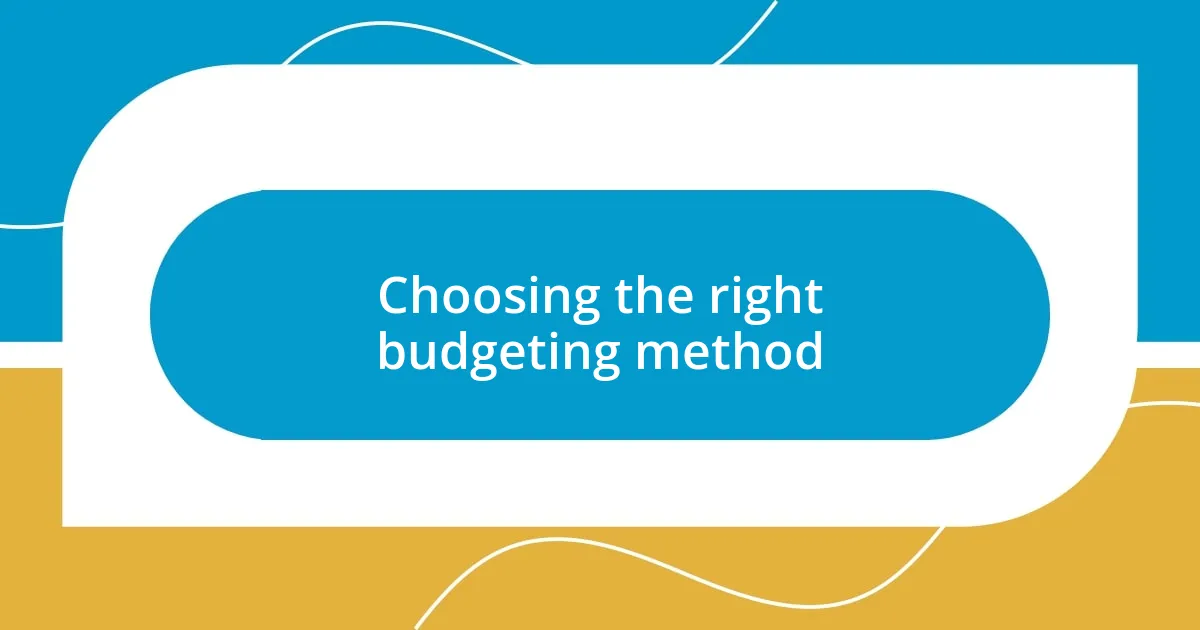
Choosing the right budgeting method
Choosing the right budgeting method can feel overwhelming, especially when so many options are available. I remember staring at various methods—like the envelope system, zero-based budgeting, or even apps that track spending. Ultimately, I chose a method that aligned with my lifestyle. For instance, the envelope system felt too rigid for me, but a more flexible approach like the 50/30/20 rule—where I allocate 50% of my income to needs, 30% to wants, and 20% to savings—offered a balanced perspective that worked wonders.
Another method that resonated with me was using a budgeting app. At first, I was skeptical about going digital, but once I experimented with one, I appreciated the instant feedback it provided on my spending habits. It almost felt like having a financial coach at my fingertips! Seeing my expenses in real-time added a layer of accountability that I didn’t know I needed. What about you? Have you tried using technology to help track your spending?
Ultimately, when choosing a method, it’s crucial to consider how each option suits your personality and financial goals. I realized I had to embrace flexibility; life is unpredictable, and a budgeting method should feel like a tool rather than a restriction. I often ask myself: does this method empower me, or does it feel burdensome? That’s a key question to explore as you dive into the world of budgeting.
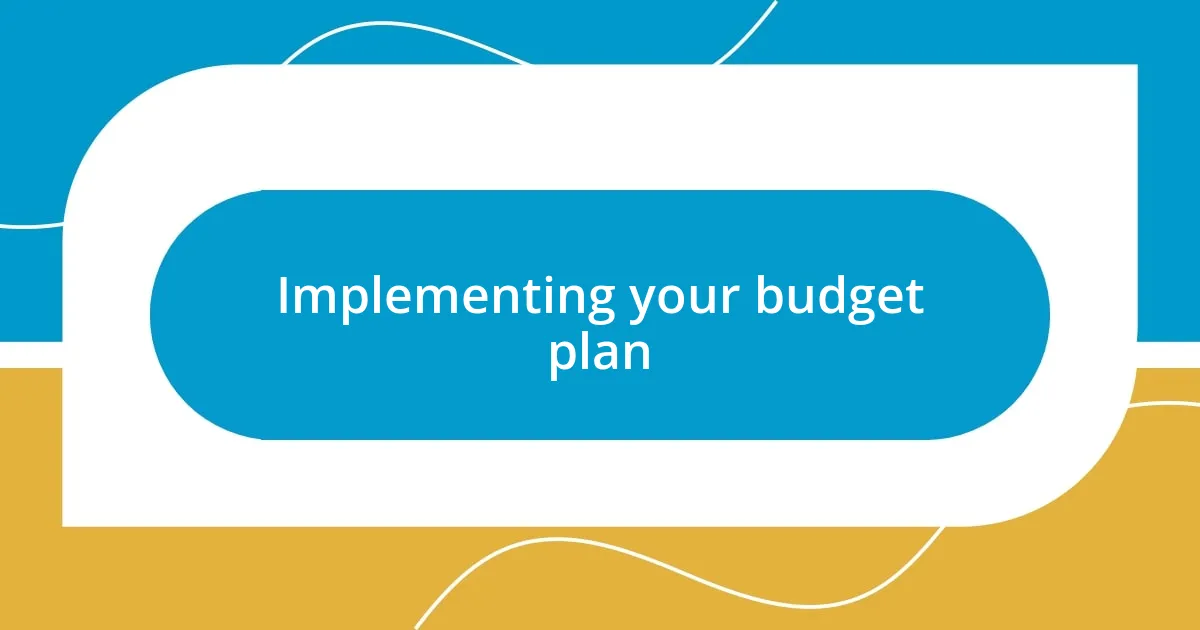
Implementing your budget plan
Implementing your budget plan requires more than just numbers; it’s about establishing a routine that sticks. I remember the first month I followed through with my budget. To keep things on track, I set aside a specific time each week to review my spending. It was empowering to check off my expenses, and I felt a sense of achievement each time I stayed within my limits. I wondered, could consistency be the secret ingredient to financial success?
As I implemented my budget, I discovered the importance of accountability. I shared my budget goals with a close friend, and it made a world of difference. We would occasionally exchange updates on how we were doing, and that mutual encouragement kept me motivated. Have you considered involving someone in your journey? A partner or even a peer can provide that extra nudge to stay committed.
I also learned that being adaptable within my budget was key. Sometimes, unexpected expenses popped up—car repairs, for instance—and I realized I had to adjust my budget to accommodate those moments. It was a lesson in flexibility. I began setting aside a small emergency fund, making it easier to navigate financial hiccups without derailing my whole budget plan. Have you found ways to prepare for the surprises life throws your way? Even little adjustments can make a big difference in your budgeting journey.
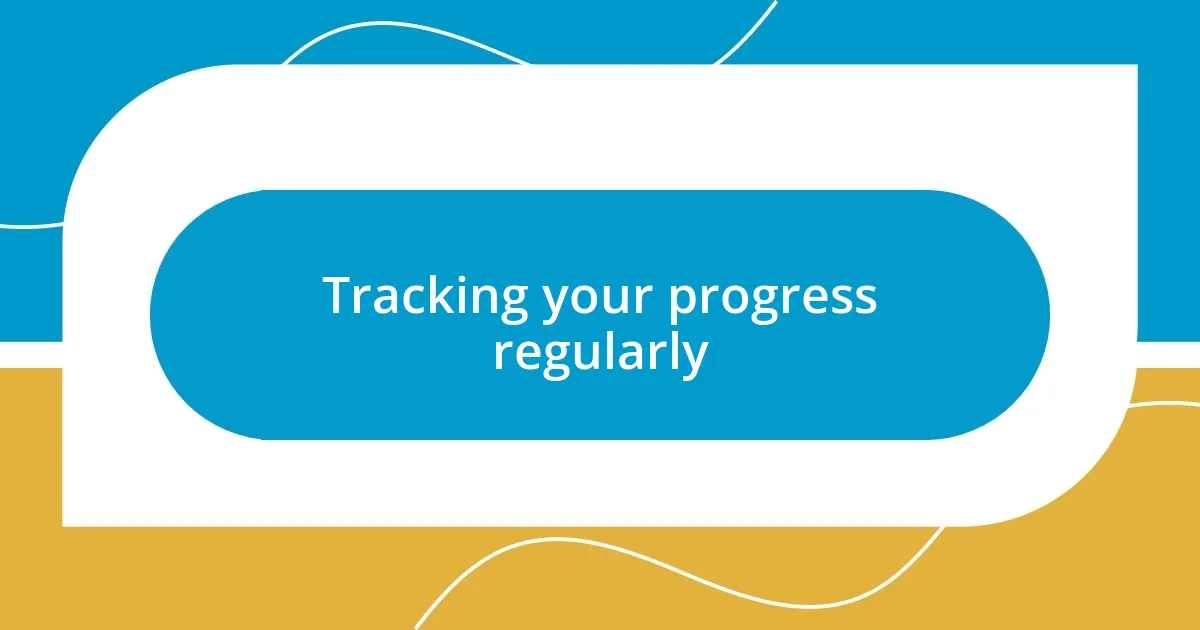
Tracking your progress regularly
Tracking your progress regularly is where the magic happens. At first, I didn’t think much of it, but that consistent check-in became my financial compass. I remember sitting down every Sunday afternoon with a cup of coffee, pulling up my budget app, and diving into my week’s spending. It was surprising how just a few minutes could either spark joy or bring about a reality check. Have you ever felt that rush of exhilaration when you realize you’ve stayed under budget?
To make it effective, I started keeping an expense journal, both online and handwritten. There’s something so satisfying about physically writing down my spending. One day, I noticed a few takeout meals piling up, and it sparked a reflection: was it convenience or laziness driving those choices? These insights not only helped me visualize my spending but also encouraged conscious decision-making. It’s fascinating how tracking encourages honesty about what truly matters to you, isn’t it?
I found that celebrating small victories was crucial too. If I hit my monthly savings goal, I’d treat myself to something special—nothing extravagant, just a new book or a cozy night in. This practice kept me enthusiastic about my financial journey and motivated me to keep pushing forward. What have you done to reward yourself during your budgeting journey? Balancing accountability with positivity can truly transform how you view your relationship with money.
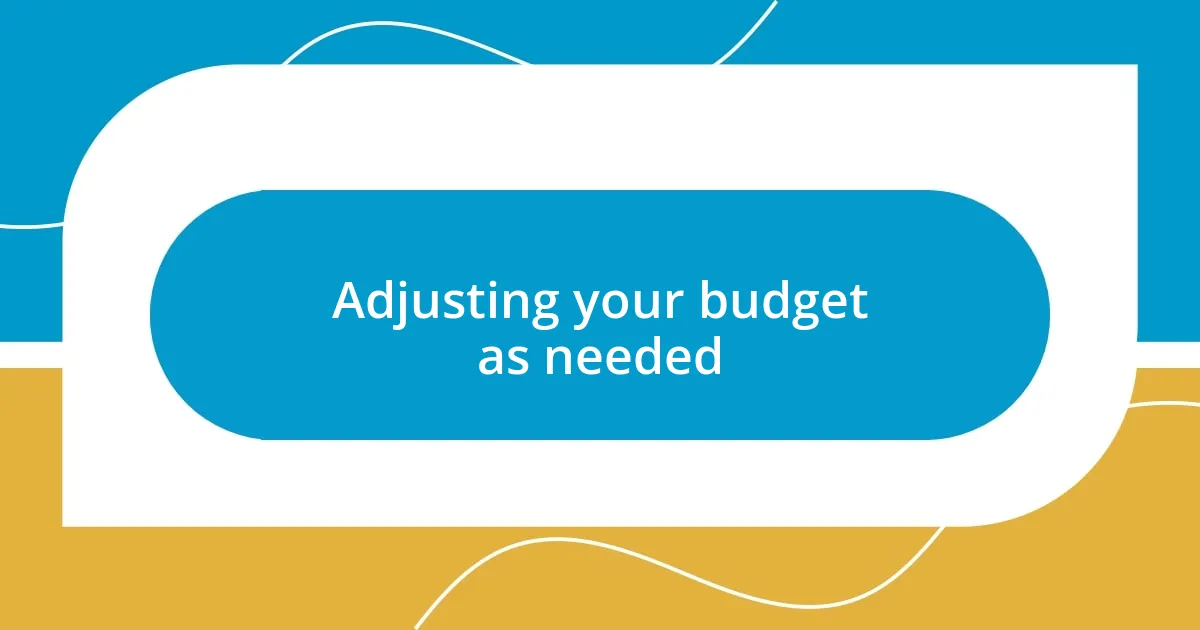
Adjusting your budget as needed
Adjusting your budget as needed is an essential skill I honed over time. Initially, I remember feeling frustrated when my spending didn’t align with my initial projections. It took me a while to realize that my lifestyle changes—like deciding to eat out more frequently—demanded a budget recalibration. Have you ever faced that moment when you had to admit your budget wasn’t quite right? For me, it sparked an eagerness to take charge rather than feel defeated.
During one financial month, I went on a spontaneous trip that really altered my budget! It was an exhilarating experience, but I knew I needed to make adjustments afterward. I learned to embrace these moments as opportunities rather than setbacks. Instead of turning my back on my budget, I’d look at my priorities and decide what could be trimmed or where I could pull from my savings. This adaptability meant I wasn’t just surviving month to month; I was crafting a budget that reflected my realities and joys. Have you thought about how your budget can evolve as you do?
Listening to how my friends approached their budgets also offered invaluable insights. I remember one telling me she reshaped her categories based on what truly mattered to her, like budgeting more for travel and less for clothing. It was an eye-opener! I started to reassess my own allocations, discovering gaps where I could make room for activities I loved. It’s remarkable how a simple tweak can reignite your financial enthusiasm, isn’t it? Each adjustment made me feel more in control, turning budgeting into a reflection of my life’s passions.












